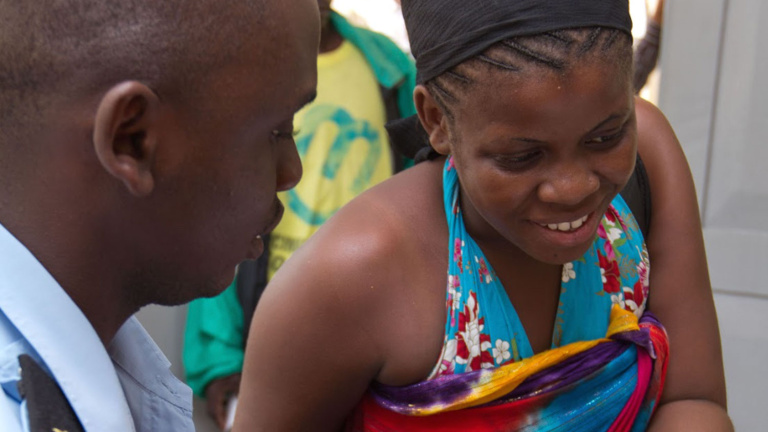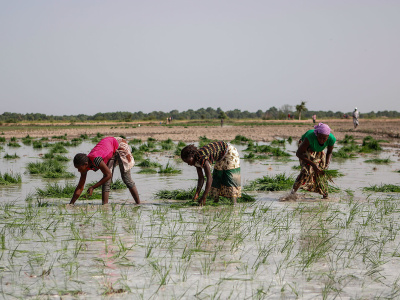
Migration policies and development: The dilemma of Agadez
Migration policies can only contribute to the stability and development of transit regions if they are founded on an understanding of the links between migration, economic development, governance and security.
The region of Agadez in Niger has become a focal point of European migration policies. Located on the main route that connects West Africa and the Sahel to more affluent countries, such as Algeria and Libya, Agadez is a vibrant epicentre of intra-African migration. An estimated 30 percent of migrants travelling this route eventually end up on a boat to Europe. Given the lack of a unified government in Libya, collaboration to stop boat departures from the Libyan coast have been largely ineffective. EU policymakers recently turned to Agadez to help stem the migration flow. Policies have mainly taken the form of technical assistance for formulating Nigerien migration action plans, alongside provision of police training to counter human smuggling. Both have resulted in a wave of arrests of smugglers and confiscation of their vehicles.
Formal data from the International Organization for Migration (IOM) Displacement Tracking Matrix (DTM) now show a 75 per cent decline in northbound migration flows on monitored routes for 2017 compared to 2016. The bus companies transporting migrants between Niamey and Agadez confirm a large drop in passengers. Many smugglers now circumvent the established routes to avoid arrest.
Those migrants who still undertake the journey face prices up to five times higher than a year ago. However, human rights abuses have become more frequent in the Agadez ghettos where migrants stay and where they have now gone underground. More are abandoned in the desert too, as smugglers have resorted to routes less travelled. Moreover, given the migration industry’s economic importance to the region, the EU-supported policies have had detrimental consequences for the Agadez population.

The downside of countering irregular migration
Many of Agadez’s important economic sectors have fallen into decline over the past decade. Tourism has suffered multiple blows: unrest due to the Tuareg rebellions, the extremist threat and the labelling of Agadez as a ‘red zone’. Uranium mining was hit by a drop in world uranium prices. To make matters worse, the government recently closed informal gold mining sites, after selling concessions to big foreign companies and to address the security threat posed by armed Sudanese and Chadian gold miners. Agricultural earnings fluctuate, but by no means can they constitute a reliable income source due to recurring periods of drought. Historically, the migration industry has provided an economic buffer. Agadez residents have supplemented their income by providing travellers goods and services, such as food, water, call shops and errand boys. Indeed, in our research, one third of respondents noted that they had earned some form of income from the migration industry.
The current migration policies overlook the vital economic importance of the migration industry to the region. They have been implemented without providing any significant economic alternatives. The European Union Emergency Trust Fund for Africa (EUTF) does reserve a large sum for long-term socio-economic development, for example, through agricultural projects. Yet, to date, no such projects have been implemented, leaving the Agadez population worse off than before the migration policies were in place. Two thirds of the respondents in our research said that the Agadez community did not benefit at all from the measures being taken to mitigate migration. However, a similar proportion observed that the Agadez community did benefit a lot from migration. The question then arises of how sustainable these policies can be, if they undermine an important economic sector in the region, without putting any real alternatives in place.
Furthermore, the EU-supported migration policies could have serious consequences for the legitimacy of regional security authorities. Our research indicated that trust in Agadez state authorities was already low. Officials were not generally seen as helpful in times of need, especially compared to more traditional authorities, such as community elders, chiefs and imams. The authorities themselves note that the EU-supported migration policies, which are coordinated with Niamey rather than the region, have pitted them to a greater extent against their local populations: “They ask us why we work for the EU rather than for them, the people who got us elected.”
Amidst such concerns, there is nonetheless little evidence of any national or international efforts to strengthen the local authorities’ legitimacy. Given the history of armed rebellion in the region, combined with the fact that Agadez’s current stability relies largely on appeasement of ethnic elites with strong ties to the transnational smuggling industry, such efforts are crucial investments to maintain the region’s stability.
Migration’s impacts on stability and local development
From the above, it follows that the drive to stop migration has resulted in implementation of policies that are not context- and conflict-sensitive and may therefore undermine local stability and development. A related problem is that due to the EU-dominated focus on stopping migration, the reduction of migrant numbers has become the sole indicator of policy effectiveness. This unilateral focus bypasses many of the larger challenges that migration poses for regional stability and local development.
For example, increasing migration has strained local infrastructure. Agadez authorities have responded by imposing visitors’ taxes on migrants transiting their communities. These resources, combined with the larger customer base for goods and services, have helped the region develop health clinics and other local services and infrastructure. Nonetheless, migratory flows have overburdened the water supply, the electricity network and garbage collection services. These kinds of strains impact the daily lives of Agadez residents, sometimes creating tensions that require monitoring and tailored interventions.
In addition, it must be recognised that the migration industry that existed before the EU-supported interventions was not entirely benign. Many migrants did not survive the harsh journey through the desert or were delivered into the hands of Libyan smugglers, who take human exploitation and mistreatment to new levels. Smuggling has empowered lawless gangs. These have increasingly come into conflict with the Agadez population, at times targeting members of particular ethnic groups.
Regulation of migration and creation of safe, legal pathways to alternate, chiefly African destinations are important tools for addressing such concerns. Unfortunately, the dominant paradigm of criminalising irregular migration without putting alternatives in place has fuelled the shady side of the migration industry. This makes it much harder to monitor what is happening, and exposes migrants to even worse human rights abuses.
The irregular migration industry creates obstructions to good governance too. Criminal transnational smuggling rings often exist by the graces of local and national political authorities – who in return benefit directly or indirectly from the smuggling activities. In Niger, for example, clear financial links are visible between smuggling kingpins and the president, such as through campaign contributions. At a more local level, security forces have benefited financially from taxation of irregular migration, demanding payments at roadblocks along the main migration routes. The current investments in police training seem to have exacerbated this problem, as the price of bribes has risen in step with the police crackdown on human smugglers. A major concern among Agadez authorities is that police corruption has risen, further undermining the local population’s trust in law enforcement.
A conflict-sensitive approach to migration management
The case of Agadez presents several important lessons for the development of migration policies that target transit and origin countries.
First, it is important to adopt a holistic approach towards migration and to consider the context in which these policies are implemented. For Agadez, the EU-supported policies are unsustainable in the long run, for multiple reasons: their failure to address police corruption, low state legitimacy, the larger backdrop of economic decline and the fact that regional stability depends on elites’ complicity in the cross-border smuggling trade. While short-term securitised fixes may seem convenient, to be sustainable, migration policies must be driven by a holistic and long-term agenda that works towards inclusive regional development and stability. At the very least, local populations should be better off because of their government’s collaboration with the EU migration agenda.
Second, for there to be any hope of long-term sustainability, the EU migration agenda has to move beyond the goal of bringing migration down to zero today. Migration management has to be founded on an analysis of the positive and negative consequences of migration for origin and transit regions, and policies must be designed to foster the former while addressing the latter. This means zooming in on locations where the migration industry shows signs of becoming particularly criminal and abusive and using EU ‘sticks and carrots’ to press for change. In this sense, the failure to connect police training in Agadez to a larger process of security sector reform aimed at addressing police corruption and insecurity in the region is a missed opportunity. Sustainable migration management also requires investing in migration’s further regularisation and normalisation, focusing on places where intra-African migration has clear benefits for host, transit and origin countries. For this a paradigm shift is needed. Migration can no longer be seen as an absolute negative phenomenon but should be valued for its merits as well.
About the author
Fransje Molenaar is a research fellow at the Conflict Research Unit (CRU), Clingendael Institute (FMolenaar@clingendael.org).
Read the full magazine issue





